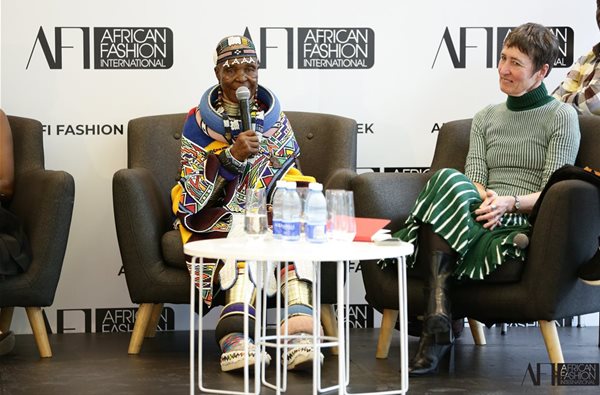
May introduced the theme by posing a multifaceted question to the audience and panellists: What does the ideal future of fashion look like?
Erica De Greef, the co-director of the African Fashion Research Institute (AFRI), kicked off the panel by sharing a story about the world-famous South African designer, Thebe Magugu. When Magugu was still a design student at Lisof, he wrote an essay evaluating Africa’s contribution to global fashion. His essay was awarded a 100% mark, an almost unheard of achievement in his Design Theory class, according to De Greef who was the lecturer at the time. Eight years later, Magugu was showcasing at Paris Fashion Week, exporting his African design aesthetic and perceptive sensibility to the world.
Sustainability is succinctly defined as: meeting the needs of the present without compromising the ability of future generations to meet their needs. There are three pillars of sustainability that are widely recognised, namely: economic, social and environmental. But in Africa there is an addition to these pillars – cultural sustainability – where our ability to preserve our cultural heritage in the present is said to impact our African identities and global contributions in the future.
De Greef used the example of South African shopping malls to further drive home the point of decolonisation. Our malls host a variety of international brands, which serve as stark reminders of a colonial era where western philosophies were sold to us as better than our own institutional knowledge and capabilities. The impact is far-reaching, affecting our economic gains and our social cohesion, and the only visible solution in the short-term is to buy and support locally-made and owned brands.
For the African creatives who are propelling their art on international platforms, understanding their cultural history and anthropology is a sure-fire way to ensure their contributions are valuable and unique. Dr Esther Mahlangu is one such artist, who has had opportunities to elevate Ndebele art and messaging through international brands. For Dr Mahlangu, continuing traditions has become her life’s purpose and she shares everything she learned from her own mother and grandmother with the youth of today.
“Respect the work of your hands,” she said. “The way you were raised in African culture, carry that wherever you go”.

Laduma Ngxokolo, the renowned designer behind the brand Maxhosa Africa, shared the sentiments of Dr Mahlangu, but uses his brand to fluidly translate diverse African cultures to local and international audiences. “I wanted [to make] a product that would outlive me,” he said, talking on the quality of his garments and other accessories. While Maxhosa Africa began as an expression of Ngxokolo’s own Xhosa heritage, he quickly branched out to incorporate multiple Xhosa identities – as well as cultural symbols relating to tribes across the continent.
From Ngxokolo’s perspective, it’s important to showcase African identities that are not one-dimensional, which reflects in his take on sustainability as well. His use of South African wool and mohair – luxury raw materials that we are famous for – creates opportunities along the fashion supply chain. At the same time, he offers all his customers a lifetime guarantee, which includes mending and repairing their garments for free, in an effort to educate people about durable fabrics and garment care.
“I wanted the product to sell itself, not the price,” he added, reminiscing on his childhood where the clothing purchased by his family was seen as an investment expected to last for years.
Vere Shaba, founder of Greendesign Africa, further added to the perspectives of sustainability from an engineering point of view. She emphasised that there is a business case for sustainability, as profit can be generated through the preservation of African prints, techniques and culture using technology. Fusing tech and cultural disruption together gives African creatives ample pathways to express identity and heritage through a modern lens.
While these tech visions of the future can provide hope, the founder of The Clothing Bank, Tracey Chambers, brought attendees back to the present when she highlighted practical short-term sustainable techniques. Chambers began her career in retail and was horrified by the leftover stock that was discarded and burnt because the supply exceeded the demand. The large informal sector within the country has allowed The Clothing Bank to blossom, by supplying unemployed women with retail clothing that they use to start their own small businesses.
Fast fashion has bombarded global markets with affordable, trendy garments that are quick to deteriorate, but The Clothing Bank has turned this into an opportunity for low-income women to support themselves and their families.
In closing, Solophina Nekesa of the Local Governments for Sustainability (ICLEI) network – raised the point of putting people at the centre of all sustainability efforts. “Planning sustainable municipalities requires all stakeholders,” she said, adding that in order to build a sustainable community, we need a collective understanding of both the natural economy and the social economy.
Whether or not international fashion houses consider African cultural preservation as a social sustainability pillar, is debatable. However, the global fashion industry is searching for alternative stories and sources of inspiration to reflect in their designs. Only time will tell if the rise of African narratives in the global fashion market is sustainable or just another fad.
Source: AFI